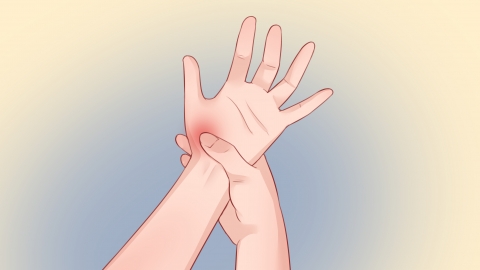What causes pain in the finger joints?
Generally, finger joint pain may be caused by factors such as overuse, cold exposure, tenosynovitis, osteoarthritis, and rheumatoid arthritis. It is recommended to seek timely medical attention to determine the underlying cause and receive appropriate treatment under a doctor's guidance. Detailed explanations are as follows:

1. Overuse: Prolonged repetitive finger movements, such as typing or doing housework, can cause repeated stress on the finger joints and surrounding tissues, leading to fatigue-related pain. Reduce repetitive finger movements, perform appropriate finger exercises during breaks, and apply heat compresses to improve joint blood circulation and relieve muscle tension and pain.
2. Cold exposure: Prolonged exposure of the fingers to cold environments can cause vasoconstriction around the joints, leading to poor circulation and pain. Keep hands warm in daily life, wear gloves when outdoors, and rinse hands with warm water after contact with cold water to avoid exacerbating discomfort from cold stimulation.
3. Tenosynovitis: Repeated friction between tendons and tendon sheaths causes inflammation, resulting in finger joint pain, limited mobility, and noticeable tenderness upon palpation. Patients may use medications such as ibuprofen gel, naproxen tablets, or prednisolone acetate injections as directed by a physician to reduce inflammation.
4. Osteoarthritis: Degeneration and wear of joint cartilage increase friction between joint surfaces, causing inflammation and pain, often accompanied by joint stiffness. Patients may use medications such as diclofenac sodium sustained-release tablets, glucosamine sulfate capsules, or sodium hyaluronate injections as directed by a physician to reduce inflammation, protect cartilage, and alleviate pain symptoms.
5. Rheumatoid arthritis: Autoimmune abnormalities attack the synovial membranes of joints, causing chronic inflammation that leads to joint pain and swelling. In severe cases, joint function may be affected. Patients should take medications such as methotrexate tablets, leflunomide tablets, or prednisone tablets as directed by a physician to suppress immune responses, control inflammation, and slow disease progression.
In daily life, it is important to protect the finger joints by avoiding lifting heavy objects or exerting excessive force, and by selecting suitable tools to reduce strain on the fingers. Appropriate finger stretching exercises can enhance joint flexibility while maintaining hand hygiene and dryness to prevent infections that may cause joint discomfort.





